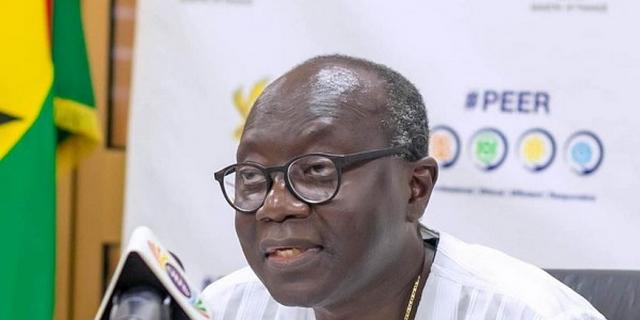Ofori-Atta Outlines 7 Key Points To Restore Ghana’s Macro-Economic Stability
Finance Minister Ken Ofori-Atta has laid before the Parliament of Ghana the Annual Budget Statement and Economic Policy of the government, indicating the measures the government wants to undertake to revitalise the economy in 2023.
In order to stabilise the country’s economy and attract local and foreign investors, the government has enumerated a seven-point agenda geared towards restoring macroeconomic stability and accelerating the country’s economic transformation after the COVID-19 pandemic.
The current economic crisis in the country has discouraged foreign investors, and the government is committed to reversing the trend to boost economic activity.
Among other things, the budget is expected to address Ghana’s debt, rising inflation, and the cedi depreciation and improve the lives of citizens.
Mr Ofori-Atta, who is facing a vote of censure, is optimistic that several solutions listed in the 2023 Budget and Economic Policy will boost economic growth.
Here are seven key points he enumerated to address the situation:
● To aggressively mobilise domestic revenue, we will, among others:
➢ Increase the VAT rate by 2.5 percent to directly support our roads and digitalisation agenda;
➢ Fast-track the implementation of the Unified Property Rate Platform programme in 2023; and
➢ Review the E-Levy Act and more specifically, reduce the headline rate from 1.5% to one percent (1%) of the transaction value as well as removal of the daily threshold.
● To boost local productive capacity, we will, among others:
➢Cut the imports of public sector institutions that rely on imports either for inputs or consumption by 50% and will work with the Ghana Audit Service and the Internal Audit Agency to ensure compliance.
➢Support the aggressive production of strategic substitutes, including the list disclosed at the President’s last address to the nation.
➢Support large-scale agriculture and agribusinesses interventions through the Development Bank Ghana and ADB Bank.
➢Introduce policies for the protection and incubation newly formed domestic industries to allow them to make the goods produced here competitive for local consumption and also for exports.
● To promote exports, we will among others:
➢Expand our productive capacity in the real sector of the economy and actively encourage the consumption of locally produced rice, poultry, vegetable oil and fruit juices, ceramic tiles among others.
● To pursue efficiency in Government expenditures, we will among others:
➢ Implement the Government directives on expenditure measures.
➢Integrate public procurement approval processes with GIFMIS to ensure that projects approved are aligned with budget allocation.
➢Review key government programmes to reflect relevance, promote efficiency, and ensure value for money.
➢Review the efficiency of Statutory Funds.
● To implement structural and public sector reform, we will among others.
➢Impose a debt limit on non-concessional financing.
➢Undertake major structural reforms in the Public Sector by reviewing the operations of 36 State-owned Enterprises, 8 Special Purpose Vehicles, 90 Joint Venture Companies, 38 Regulatory institutions, 68 Statutory Bodies and 6 Subvented Agencies.
➢Enforce compliance with legal and regulatory framework on foreign exchange.
➢Initiate measures to overhaul the tax structures in the extractive industry.
➢ Expand the gold purchase programme by Bank of Ghana to support FX Reserve accumulation, promote an LBMA certified gold refinery in Ghana and promote local currency stability.
● To safeguard the social protection programmes, we will among others:
➢Expand social protection programmes such as LEAP, School Feeding, and NHIS for the vulnerable and socially excluded.
● Implement structural and public sector reforms.
➢ These include directives on several expenditure cut measures.



